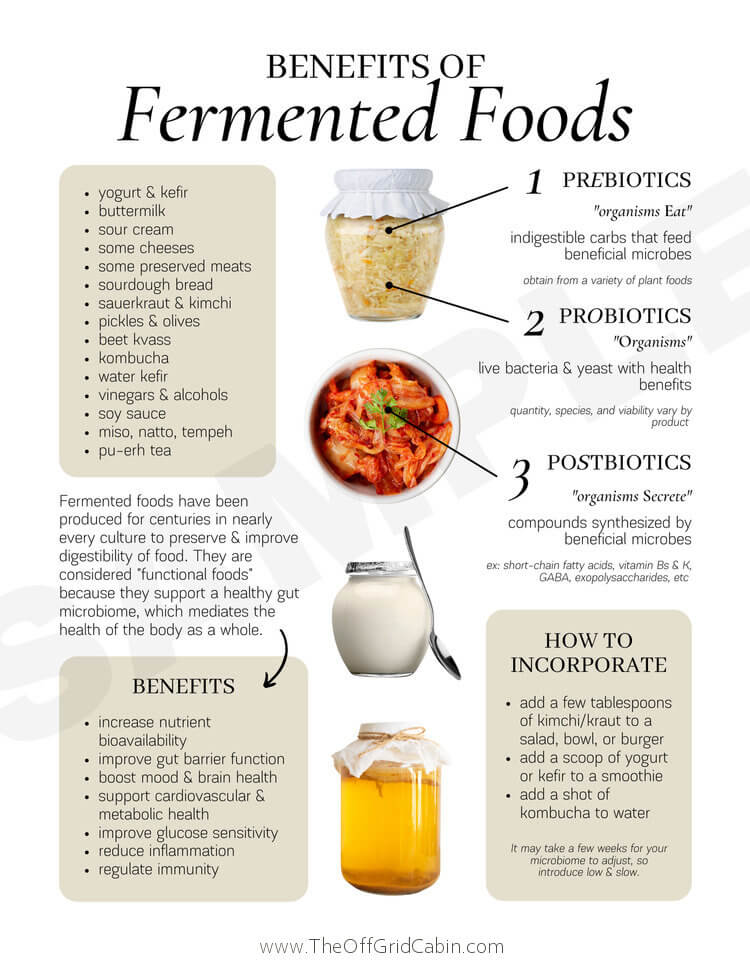The Gut Health Guide to Fermented Foods
Have you ever wondered about the benefits of incorporating fermented foods into your diet? Fermented foods have been used for centuries to promote gut health and overall well-being. In this guide, we will explore the different forms of fermented foods, their impact on your gut health, and some delicious recipes you can try at home.

Understanding Fermented Foods
Fermented foods are created through the process of lacto-fermentation, where natural bacteria feed on the sugar and starch in the food, creating lactic acid. This process not only preserves the food but also creates beneficial enzymes, B-vitamins, omega-3 fatty acids, and various strains of probiotics. These probiotics are essential for maintaining a healthy gut microbiome, which has been linked to improved digestion, immune function, and mental health.
For centuries, different cultures around the world have been fermenting foods to preserve them and enhance their nutritional value. Today, fermented foods have gained popularity in the health and wellness community for their gut health benefits and unique flavors.
Benefits of Fermented Foods
Fermented foods offer a wide range of health benefits, including:
- Improved digestion: The probiotics in fermented foods help restore the balance of good bacteria in your gut, promoting better digestion and reducing symptoms of bloating, gas, and constipation.
- Enhanced nutrient absorption: The enzymes produced during fermentation help break down food, making it easier for your body to absorb essential nutrients.
- Boosted immune system: A healthy gut microbiome is essential for a strong immune system. By consuming fermented foods, you can support your body’s natural defense mechanisms.
- Mental health support: Emerging research suggests a strong connection between gut health and mental well-being. Fermented foods may help alleviate symptoms of anxiety, depression, and other mood disorders.

Types of Fermented Foods
There is a wide variety of fermented foods to choose from, each offering unique flavors and health benefits. Here are some common types of fermented foods you can incorporate into your diet:
1. Sauerkraut
Sauerkraut is a type of fermented cabbage that originated in Germany. It is made by combining shredded cabbage with salt and allowing it to ferment for several days or weeks. Sauerkraut is rich in probiotics, fiber, and vitamin C, making it a nutritious addition to your meals.
2. Kimchi
Kimchi is a traditional Korean dish made from fermented vegetables, most commonly cabbage and radishes. It is seasoned with garlic, ginger, and chili peppers, giving it a spicy and tangy flavor. Kimchi is packed with probiotics, antioxidants, and vitamins A and C, making it a flavorful and healthy side dish.
3. Kombucha
Kombucha is a fermented tea drink that has gained popularity for its fizzy texture and tangy flavor. It is made by fermenting sweetened tea with a culture of bacteria and yeast known as a SCOBY (symbiotic culture of bacteria and yeast). Kombucha is rich in probiotics, antioxidants, and organic acids, offering a refreshing and energizing beverage option.
4. Yogurt
Yogurt is perhaps one of the most well-known fermented foods, made by fermenting milk with live cultures of bacteria. It is a good source of probiotics, calcium, and protein, making it a nutritious and versatile food option. You can enjoy yogurt on its own, in smoothies, or as a topping for savory dishes.
5. Miso
Miso is a traditional Japanese seasoning made by fermenting soybeans with salt and a type of mold known as koji. It has a savory and salty flavor, making it a popular ingredient in soups, marinades, and dressings. Miso is rich in probiotics, antioxidants, and essential amino acids, offering a flavorful and nutrient-dense addition to your dishes.

Incorporating Fermented Foods into Your Diet
Now that you know about the benefits and types of fermented foods available, it’s time to start incorporating them into your diet. Here are a few tips to help you add more fermented foods to your meals:
-
Start slowly: If you are new to fermented foods, introduce them gradually into your diet to allow your body to adjust to the probiotics. You can begin with small servings and gradually increase your intake over time.
-
Include a variety: Experiment with different types of fermented foods to discover new flavors and textures. Try incorporating sauerkraut into your salads, adding kimchi to your rice bowls, or enjoying yogurt with fresh fruit and nuts.
-
Make your own: If you enjoy cooking and experimenting in the kitchen, consider making your own fermented foods at home. There are plenty of recipes available online for homemade sauerkraut, kombucha, yogurt, and other fermented delights.
-
Pair with prebiotic foods: Prebiotics are non-digestible fibers that feed the beneficial bacteria in your gut. Pairing fermented foods with prebiotic-rich foods like bananas, onions, garlic, and whole grains can enhance the growth of good bacteria in your gut.
By incorporating a variety of fermented foods into your diet, you can support your gut health, improve your digestion, and boost your overall well-being. Experiment with different flavors and recipes to find the fermented foods that work best for you.
Fermented Foods Recipes
To get you started on your fermented foods journey, here are some simple and delicious recipes you can try at home:
Sauerkraut
-
Ingredients:
- 1 head cabbage, thinly sliced
- 1 tbsp sea salt
- Caraway seeds (optional)
-
Instructions:
- In a large bowl, combine cabbage and salt. Massage the cabbage with your hands for 5-10 minutes until it releases juices.
- Pack the cabbage tightly into a clean glass jar, pressing it down to submerge in its juices.
- Add caraway seeds for extra flavor (optional).
- Cover the jar with a lid or cloth and let it ferment at room temperature for 1-2 weeks.
- Enjoy sauerkraut as a tangy side dish or topping for sandwiches and salads.
Homemade Yogurt
-
Ingredients:
- 4 cups milk
- 2 tbsp yogurt starter culture
-
Instructions:
- Heat the milk in a saucepan until it reaches 180°F (82°C), then let it cool to 110°F (43°C).
- Add the yogurt starter culture to the milk and mix well.
- Pour the mixture into a clean glass jar and cover with a lid or cloth.
- Place the jar in a warm spot (around 110°F) and let it ferment for 8-12 hours.
- Refrigerate the yogurt for at least 4 hours before enjoying it with your favorite toppings.
Ginger Kombucha
-
Ingredients:
- 4 cups brewed tea
- 1 cup sugar
- 1 SCOBY
- 1 cup kombucha starter liquid
- Fresh ginger, sliced
-
Instructions:
- Dissolve the sugar in brewed tea and let it cool to room temperature.
- Pour the sweetened tea into a clean glass jar and add the SCOBY and kombucha starter liquid.
- Cover the jar with a cloth and secure with a rubber band. Let it ferment at room temperature for 7-14 days.
- Add fresh ginger slices during the second fermentation for extra flavor.
- Strain the kombucha, bottle it, and refrigerate before serving.
By trying these simple recipes at home, you can experience the fun and flavor of fermenting your own foods while reaping the health benefits of probiotics and enzymes.

Final Thoughts
Incorporating fermented foods into your diet is a simple and delicious way to support your gut health and overall well-being. By consuming foods like sauerkraut, kimchi, kombucha, yogurt, and miso, you can nourish your gut microbiome, improve your digestion, and boost your immune system.
Experiment with different flavors and recipes to find the fermented foods that you enjoy the most. Whether you purchase them from a store or make them at home, fermented foods offer a wealth of health benefits and culinary possibilities. Start your fermented foods journey today and experience the transformative power of probiotics and enzymes on your gut health.


